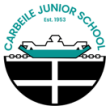Speaking and listening
Oracy
What is Oracy?
Oracy is teaching children to talk and teaching children through talk.
The national curriculum stipulates the importance of spoken language in pupil’s development across the curriculum. Therefore, we intend to facilitate various opportunities where children will listen and see quality language, which in turn will develop their grammar and vocabulary skills and their understanding of reading and writing.
Intent:
At Carbeile, we intend to:
- Develop children’s abilities to: communicate, describe and evaluate their work and the works of others with effective use of language;
- To develop their vocabulary so that they are able to express themselves with accuracy, using words and phrases which are ambitious and aspirational in all subject areas;
- To build children’s confidence and competence in spoken language and listening skills, so that they are able to express themselves and consider their own well-being.
Implementation:
We endeavour to implement and foster a confident cohort of children by:
- Texts used during TfW sessions have a variety of powerful vocabulary choices, key grammatical features explicitly linked to the year group objectives and structural features that correspond with the unit of writing.
- Oracy activities, along with storytelling and vocabulary activities, will form the first part of any TfW sequence
- Children will regularly learn sections or whole texts linked to the TfW scheme
- Children have opportunity to learn and internalise patterns of language, adding key vocabulary to their linguistic repertoire and utilising it within their own writing this also builds children’s confidence when speaking within or in front of audiences.
- Opportunities to hold debates in all areas of the curriculum, lending well to the areas covered in topic, science and RE. These Oracy specific tasks not only link to the work completed in topic, but also inform children’s writing during English sessions.
- Children are able to voice their opinions, respect those of others and develop a more well-rounded knowledge of the area being covered.
Pupils also have a range of planned Oracy experiences (this is not an exhaustive list), which include:
- drama;
- talking partners;
- listening to stories;
- reading lessons;
- preparation for writing;
- visiting speakers;
- giving and receiving instructions;
- paired/collaborative work;
- problem solving in maths;
- presentation of learning;
Impact:
- Children enjoy taking part in class debates and are able to articulate their point of view effectively
- children perform confidently in class, assemblies, productions and when speaking to others such as governors and visitors
- Children read expressively in whole class reading sessions, and know how to use their voice to express emotion.
Children will become more confident within the four strands of the Oracy framework:
- Physical aspects – how we use our voice and body to communicate
- Linguistic aspects – how we structure what we say and choose appropriate vocabulary
- Cognitive aspects – staying focused whilst speaking and when listening to others, asking appropriate questions and explaining opinions using reasons
- Social & emotional aspects – working with others, listening and responding, increasing confidence
Assessment and reporting:
Teachers will use the ‘Oracy skills progression map’ to assess children’s Oracy skills in the 4 main areas: Physical, linguistic, cognitive and social & emotional
